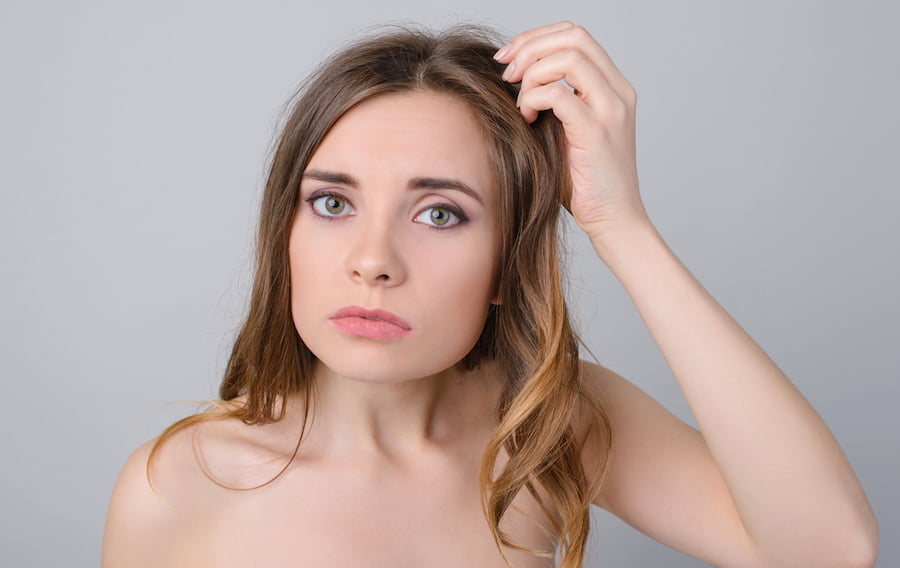
PCOS Hair Loss: Causes, Treatments, and Remedies for Thinning Hair
PCOS hair loss can be a heart-wrenching experience, especially when there seems to be no obvious reasons for the PCOS.
But what if I told you that there are ways to understand and manage PCOS hair loss? That by understanding the root cause and taking proactive steps, you can regain control?
Let’s take this journey together, exploring the causes, symptoms, treatments, and remedies for PCOS-related hair loss.
Short Summary
-
PCOS-related hair loss is a form of androgenic alopecia caused by hormonal imbalances.
-
Treatments focus on rebalancing hormones to reduce symptoms and promote healthy hair growth.
-
Professional help should be sought if PCOS hair loss affects daily activities, interests, or relationships.

I LOVE MY HAIR NOW
FullyVital hair serum and hair vitamins made tremendous improvements in my hair. I truly love my hair now.
Dorit S.,
Understanding PCOS-Related Hair Loss
Your hair needs a healthy balance of hormones to grow and flourish. Unfortunately, PCOS can disrupt this delicate balance, leading to hair loss.
PCOS-related hair loss is a form of androgenic alopecia, a condition that is similar to male pattern baldness and can also manifest as female pattern baldness. It frequently occurs in women of reproductive age.
It’s a consequence of hormonal imbalances, specifically elevated testosterone levels that transform into dihydrotestosterone (DHT).
This potent form of testosterone can shrink hair follicles, leading to thinning hair or male pattern hair loss on the scalp.
But there’s good news. Treatments for PCOS hair loss can help rebalance your hormones and stimulate hair growth. It’s important to remember that you’re not alone in this.
Hair loss is a common symptom of PCOS, affecting a significant number of women with the condition.
Hormonal Imbalance and Hair Growth
The hormone DHT shrinks the hair follicles and negatively impacts your hair growth cycle. In both men and women, around 10% of testosterone is metabolized into DHT, a hormone that can affect healthy hair growth.
In women with PCOS, elevated levels of testosterone can lead to more DHT, disrupting the hair growth cycle and leading to hair thinning and loss.
Treatments for PCOS-related hair thinning focus on addressing this hormonal imbalance. By regulating androgen levels, these treatments can help reduce hair loss symptoms and promote healthy hair growth.
Prevalence of PCOS-Related Hair Loss
Hair loss due to PCOS, including female pattern hair loss, is not a rare anomaly. It’s a common symptom of PCOS, affecting 20-30% of women with the condition.
This is due to the increased androgenic hormones present in women with PCOS, which can also cause excess hair growth, including facial hair.
So, if you’re dealing with hair thinning or loss and have PCOS, you’re not alone. It’s important to remember that these symptoms are a common part of the PCOS journey. But just like any journey, there are steps you can take to navigate your way through it.
One such step is maintaining a good scalp health routine, as inadequate washing can lead to dirt and oil blocking the follicles, which can aggravate hair thinning and lead to further scalp damage.
Identifying PCOS Hair Loss Symptoms
Recognizing the symptoms of hair loss from PCOS is a crucial step towards treatment. These symptoms look familiar to female pattern baldness and can include:
-
Shedding
-
An itchy and dry scalp
-
Bald patches
-
Hair loss around the temples and frontal regions of the scalp
Additionally, polycystic ovary syndrome (PCOS) can result in androgenetic alopecia or female pattern hair loss, a patterned loss of hair due to an increased production of testosterone.
Maintaining scalp health is also vital in managing PCOS hair thinning. An unhealthy scalp can worsen hair loss symptoms, including a receding hairline.
By observing these symptoms early, you can navigate your way towards effective interventions and treatments.
Shedding and Breakage
Hair shedding and breakage are common symptoms of PCOS-related hair loss, resulting from weakened hair follicles.
It’s not uncommon for individuals with PCOS to experience increased shedding on a daily basis. This can manifest in the form of greater amounts of hair on clothing, furniture, or pillowcases overnight.
PCOS-related hair loss is identifiable by female pattern hair loss, which is a thinning of hair due to male hormones.
Women commonly report hair loss in the vicinity of their temples and frontal regions of the scalp. Hair loss may be concurrent with other PCOS symptoms such as:
-
weight gain
-
diabetes
-
acne
-
abnormal facial or body hair.
Scalp Health
Maintaining scalp health is important to treat hair loss. An unhealthy scalp can aggravate hair loss symptoms, making the condition worse. Therefore, sustaining scalp health is critical in managing PCOS hair loss.
PCOS hair loss on the scalp may manifest as:
-
Sudden and abundant shedding
-
An itchy and dry scalp
-
Bald patches
-
Thinning of the hair on the scalp
By keeping the scalp clean and healthy, you can create a favorable environment for healthy hair growth.
Medical Treatments for PCOS Hair Loss
When lifestyle changes and natural remedies aren’t enough, medical treatments can offer an effective solution for PCOS or androgenic alopecia.
These treatments may include hormone-balancing medications, such as oral contraceptives and antiandrogens, as well as consultation with a trichologist, a specialist in the health of the hair and scalp.
A trichologist can diagnose and treat PCOS symptoms, providing a personalized treatment plan for each individual.
They can offer more in-depth advice on maintaining scalp health and suggest specific treatments, such as minoxidil (Rogaine), iron supplements, and topical treatments like essential oils.
Hormone Balancing Medications
Hormone-balancing medications play a crucial role in treating hair loss associated with PCOS. These medications, including oral contraceptives and antiandrogens, work to regulate male hormones, control hair loss and reduce symptoms.
Oral contraceptive pills, for instance, have been demonstrated to reduce androgen levels, slowing down the rate of shedding.
Other medications, such as spironolactone and finasteride, are frequently employed in treating PCOS thinning and androgenic alopecia.
In addition, minoxidil has been found to stimulate hair growth and reduce the amount of shedding and help a receding hairline.
Trichologist Consultation
A trichologist consultation can provide invaluable guidance when navigating the path of PCOS-related hair loss. A trichologist is a hair and scalp specialist who can diagnose and treat hair loss conditions.
During the consultation, they conduct an examination of the scalp, obtain hair samples, and potentially request blood work to diagnose the condition.
Subsequently, the trichologist will formulate a treatment plan to facilitate successful management of the condition.
By suggesting a course of treatment to promote the regrowth of hair follicles, trichologists provide a personalized approach to managing PCOS-related hair loss.
Their expertise and personalized care can make a significant difference in the journey towards healthier hair.
Lifestyle Changes to Combat PCOS Hair Loss
While medical treatments can be effective, they’re not the only option for managing PCOS-related hair loss.
Lifestyle modifications, such as weight loss, stress management, and regular physical activity, can also play a significant role in managing hair loss symptoms.
In addition, sticking to a well-balanced diet that’s high in vitamins and nutrients can promote hair health and potentially reduce hair loss for those with PCOS.
By making these lifestyle changes, you can take a proactive role in managing your symptoms and promoting overall well-being.
Stress Management
Managing stress is an important part of any healthy lifestyle - and it’s especially crucial when dealing with PCOS-related hair loss.
Stress can exacerbate hair loss by stimulating hair follicles to enter a resting phase, resulting in the shedding of hair strands.
Fortunately, there are many ways to manage stress. Techniques such as exercise, meditation, and other relaxation strategies can be beneficial in reducing PCOS hair loss symptoms.
By incorporating these stress management techniques into your daily routine, you can help combat PCOS hair loss and promote overall well-being.
Diet and Nutrition
Just as a plant thrives when nourished with the right nutrients, so too does your hair.
A well-balanced diet that’s high in vitamins and nutrients can go a long way in promoting hair health. Some foods that are beneficial for PCOS hair loss include:
-
Non-starchy vegetables
-
Fruits
-
Lentils
-
Peas
-
Legumes
-
Barley
Consuming foods with a low glycemic index, such as these, may be advantageous for PCOS hair loss.
Vitamins and minerals play a crucial role in the growth of healthy hair. Some essential vitamins and minerals for hair health include:
-
Vitamin A
-
Vitamin B
-
Vitamin C
-
Vitamin E
-
Zinc
-
Iron
-
Biotin
Adhering to a balanced diet can assist in decreasing inflammation, regulating hormones, and improving overall health, which can help reduce hair loss in PCOS patients.
Natural Remedies for PCOS Hair Loss
In addition to lifestyle changes and medical treatments, natural remedies can offer an alternative or supplement for managing PCOS-related hair loss.
These remedies include a wide range of options, from essential oils and topical treatments to scalp care techniques.
Essential oils, for example, can offer a natural and gentle way to stimulate hair growth and improve scalp health. Topical treatments can strengthen hair and reduce shedding related to female pattern hair loss.
Furthermore, regular scalp massages using a bamboo hair brush can enhance circulation and foster hair growth by supplying nutrients and oxygen to the hair follicles.
Essential Oils
Essential oils are much like these beneficial plants - each has its unique properties and can offer specific benefits for hair health.
These natural oils, obtained from plants, have potential benefits for addressing hair loss associated with PCOS.
Some essential oils that are believed to be beneficial in addressing hair loss associated with PCOS include:
-
Clary sage
Peppermint oil, for instance, can promote hair growth. By incorporating these essential oils into your hair care routine, you can naturally enhance hair growth and improve scalp health.
Topical Treatments
Topical treatments can offer a myriad of benefits for your hair and scalp. Minoxidil is often recommended for women experiencing female pattern hair loss.
Women can also try using natural hair growth serums that can balance the hormones on their scalp.
By using such natural topical treatments, you can take a proactive step towards managing your PCOS hair loss.
Scalp Care Techniques
Taking care of your scalp is a crucial part of ensuring that what grows from it - in this case, your hair - is healthy and strong. Regular scalp massages, for instance, can enhance circulation and foster hair growth.
In addition to massages, other scalp care techniques such as regular washing and avoiding tight hairstyles can also contribute to a healthier scalp and stronger hair.
By incorporating these techniques into your daily routine, you can cultivate a healthier scalp and promote hair growth.
We recommend using a comprehensive hair growth system - that addresses your hair loss in multiple ways to grow thicker, fuller hair.
When to Seek Professional Help
It's important to know when to seek professional help for PCOS hair thinning. If your hair loss is impacting your daily activities, interests, or relationships, it’s time to seek professional help.
Healthcare providers, such as dermatologists, can assess your hormone levels and recommend appropriate treatments. They can provide a more in-depth understanding of your condition and guide you towards the best course of action. Remember, you don’t have to navigate this journey alone - professionals are there to help you every step of the way.
Summary
Navigating the journey of PCOS-related hair loss can be challenging, but remember, you’re not alone. From understanding the hormonal imbalances that contribute to hair loss to recognizing the symptoms and exploring treatment options, you have the power to take control of your hair health.
Remember, there’s no one-size-fits-all solution to PCOS hair loss. What works for one person may not work for another. It’s important to explore different options, from medical treatments to natural remedies, and find what works best for you.
Finally, remember that help is available. Whether it’s a healthcare professional, a trichologist, or a supportive online community, you don’t have to face this journey alone.
Frequently Asked Questions
Will hair loss from PCOS grow back?
With treatment, you may be able to stimulate the growth of new hair for PCOS thinning. However, it is important to note that this will not guarantee full recovery and your hair may not return to its original state.
Additionally, there are ways to mask the effects of PCOS thinning.
How do you fix PCOS hair loss?
Treating PCOS hair loss typically involves a combination of medications such as Spironolactone, birth control pills, minoxidil, finasteride and dutasteride, PRP, low-level laser light therapy, and even hair transplants.
You can also consider hair growth supplements to balance circulating levels of DHT, and hair growth serums to balance the hormones on your scalp.
Depending on the severity of the hair loss, you may need to try a few different treatments before seeing results.
Can PCOS lead to hairfall?
Yes, PCOS can lead to hairfall due to its associated higher than normal levels of testosterone, which affects hair growth.
This male-pattern hair loss is often seen in women with polycystic ovary syndrome (PCOS), and between 20–30% of people with PCOS have female pattern hair loss.
If you lose your hair from PCOS, it probably won’t grow back by itself.
How to cure PCOS permanently?
Although PCOS is a chronic condition with no permanent cure, it can be managed successfully by making certain dietary and lifestyle changes. This will help improve the quality of life significantly.
What hormones influence hair growth?
Androgens and estrogens are hormones that play an important role in regulating hair growth.
These hormones are responsible for the growth and maintenance of hair follicles, as well as the production of sebum, which helps to keep the scalp and hair hydrated.
What are some PCOS hair loss home remedies?
Hair loss from PCOS is often due to hormonal imbalance. While there's no surefire PCOS hair loss home remedies, maintaining a healthy diet, exercising regularly, and managing stress can help improve overall health and potentially reduce hair loss.
Some also find topical applications of natural substances like aloe vera or rosemary oil beneficial.
What are some beneficial pcos hair loss supplements?
Hair loss supplements that help reduce the conversion from testosterone to DHT can be effective for individuals with pcos. Try Enhance hair growth supplements, it contains three powerful ingredients to reduce conversion from testosterone to DHT.







